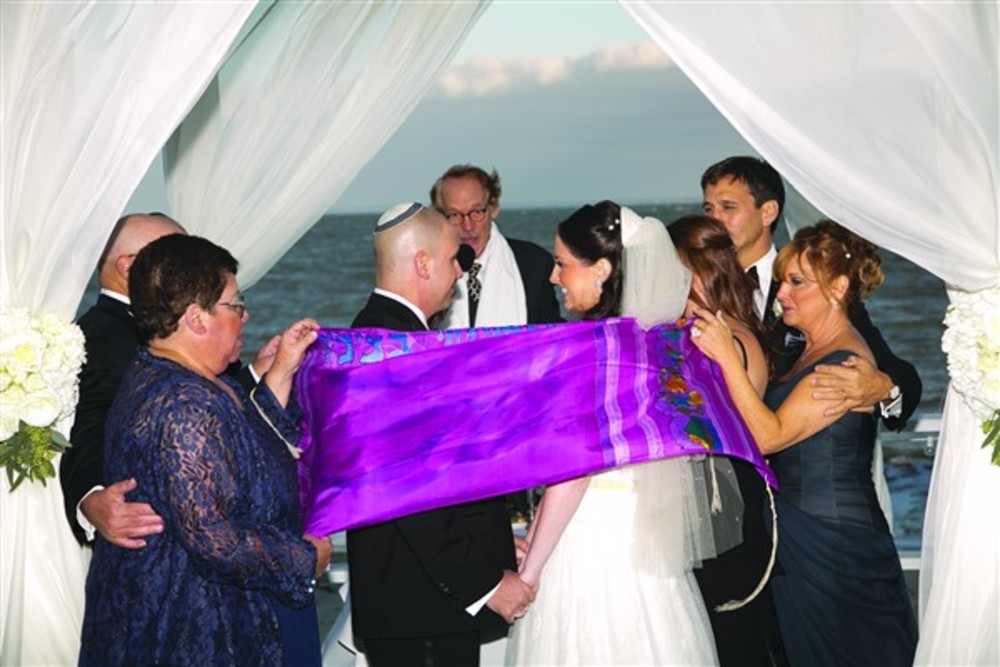The beauty of off-peak weddings
 A wedding is happy in any season. /Courtesy | H&H Photographers
A wedding is happy in any season. /Courtesy | H&H Photographers
When we think of wedding photos, we usually picture a beautiful couple posing somewhere picturesque – maybe on a beach, strolling along the waves, or at a park, standing next to some colorful plants. What about those couples who dispense with the traditional idea of a sunny weekend ceremony? Are they trying too hard to be different or are they onto something? Why would someone take a chance on the weather and plan a winter wedding? Or, even stranger, why have a brunch instead of a dinner reception? Since wedding etiquette and style are forever changing, a couple of professionals provided some guidance to keep those planning their big day abreast of the latest trends.
Cigall Goldman, founder and CEO of mazelmoments.com, a site that celebrates Jewish events and offers free resources that include a Jewish Wedding Timeline & Checklist, says that she is seeing an increase in off-peak weddings. That broad category includes not only months – October through April are less in-demand than the rest – but also days, with weekdays gaining in popularity. The most adventurous couples are even moving up their celebrations to earlier in the day – brunch fanatics have made their choice in vogue. Of course, the most obvious advantage of straying from the norm is the ability to negotiate deals and benefit from savings offered by business-hungry vendors filling gaps in their schedule. The lack of demand affords the bride and groom the luxury of higher discounts and more choice. Goldman points out that another benefit is guest availability, “You’re not competing as much with vacations and other special events.”
Bonnie Gold is the artistic half of Gold Events, “Elegant and Creative Event Planning in Boston, Massachusetts and Rhode Island,” as the company’s site describes their services. She counts on her 15-plus-year career in the industry to guide her decisions. Along with her husband, Jerry Gold, the business part of the team, Gold ensures that her clients’ weddings are not only stylish but creatively designed using cost-effective methods, such as donated resources. She, too, thinks that having an off-season wedding encompasses multiple advantages, including, “venue availability with better price options, time options and additional value items,” as well as “availability of a wider range of vendors and vendor packages.” In her opinion, the best way to find discounts during the off-season is to hire a planner who “can do all the legwork for you.” She says that a planner will know which questions to ask and what items to request. Also, Gold thinks that their services “take the burden of time off the couple” by offering a list of choices. Other options, such as investing some time into searching the Internet, interviewing providers at venues, talking to people who were happy with their preferences on their wedding day help too.
Goldman believes that “the best advice will likely come from people in similar situations.” She suggests that you gather referrals through word-of-mouth and social media. But even if someone greatly recommends a company, it doesn’t mean that you will have the same experience. Interviews will narrow down those vendors with whom you will enjoy working. Goldman thinks that finding somebody “who is responsive to your needs and whose personality and work ethic complement yours” is the most important factor in the planning process. Once you settle on a vendor, you can address the issue of discounts that the company can offer you or the packages and installment plans they can customize.
Of course, not every aspect of an off-peak wedding is guaranteed to be positive. Outdoor ceremonies aren’t possible in frosty weather, for instance. Even if the temperatures might allow for placing the chuppa in a scenic view, couples should have a plan B in case that lonely cloud turns into a downpour. Also, don’t think that it’s slow season everywhere just because it’s off-peak time for weddings. The colder months that find no favor with brides and grooms, for example, appeal to business travelers who gather at resorts for conventions. It’s a good idea to call the resort to find out when their slow season begins so that you are not competing for lounge chairs with hordes of people during your honeymoon. If yours is a destination wedding, consider holding it on a weekday to save money. The wedding party has to travel anyway – they might not mind if the event doesn’t fall on a weekend. In addition, ask for a group discount since all of your guests will probably stay in the same spot. Often, people are hesitant to inquire about deals out of embarrassment or awkwardness. It doesn’t hurt to ask, though – the worst that can happen is that the answer will be “no.”
With regards to particulars, the same advice applies to off-season weddings as to those in peak-season. This includes sticking with local products, such as flowers, and signing up for alerts from bridal salons to learn about end-of-season sales. Also, don’t forget to take advantage of the sales department stores hold during the first three months of the year to score bargains on bridesmaid dresses and mother-of-the-bride gowns. The most important tip to keep in mind, though, is to remember the big picture – the goal is to celebrate your love for each other and have fun working as a team on your special day. Gold says, “Don’t let little things while planning take away from what this day is really about!” Goldman echoes that sentiment, pointing out, “Wedding planning should be fun and bring the couple closer together.” L’chaim and mazel tov!
IRINA MISSIURO is a writer and editorial consultant for The Jewish Voice.







